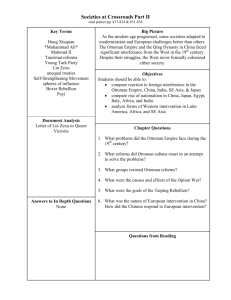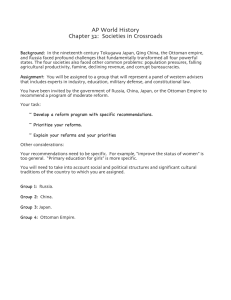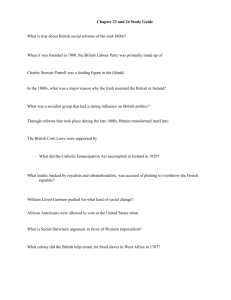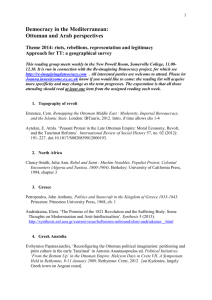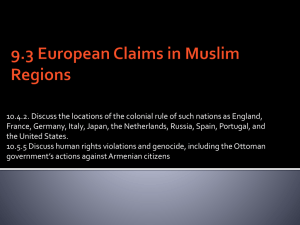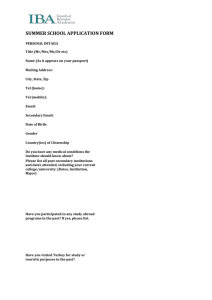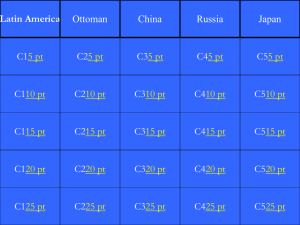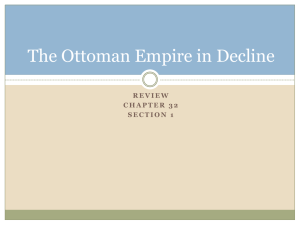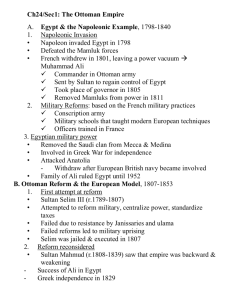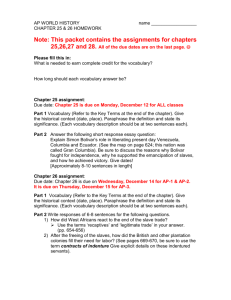Name__________________________________________
advertisement
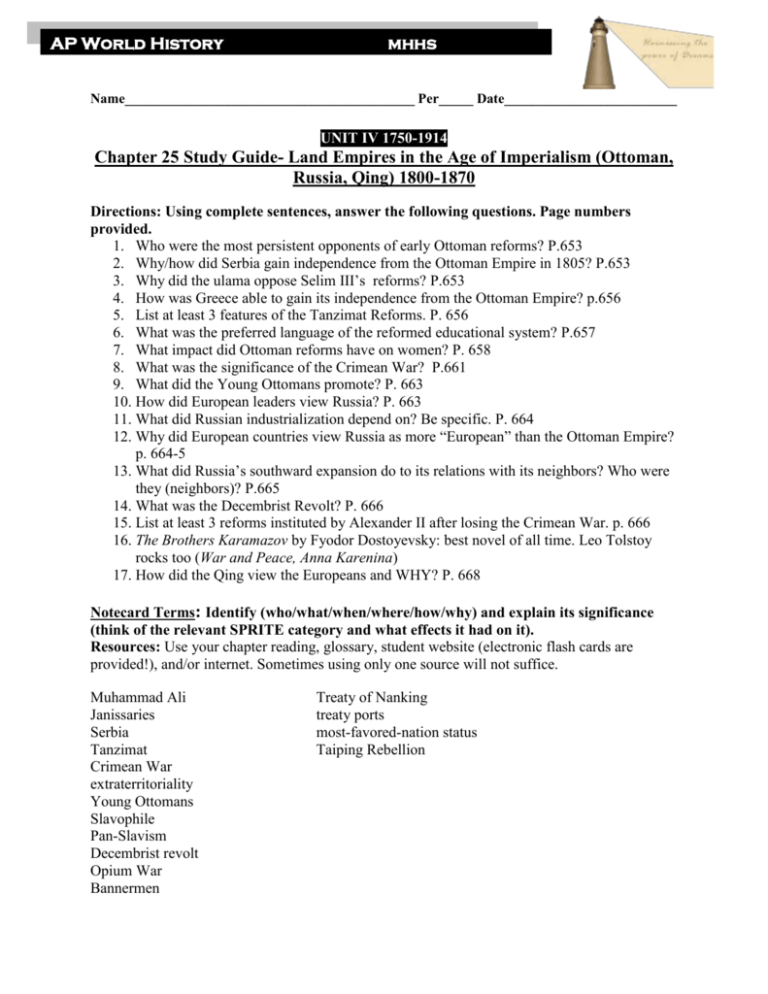
AP World History mhhs Name__________________________________________ Per_____ Date_________________________ UNIT IV 1750-1914 Chapter 25 Study Guide- Land Empires in the Age of Imperialism (Ottoman, Russia, Qing) 1800-1870 Directions: Using complete sentences, answer the following questions. Page numbers provided. 1. Who were the most persistent opponents of early Ottoman reforms? P.653 2. Why/how did Serbia gain independence from the Ottoman Empire in 1805? P.653 3. Why did the ulama oppose Selim III’s reforms? P.653 4. How was Greece able to gain its independence from the Ottoman Empire? p.656 5. List at least 3 features of the Tanzimat Reforms. P. 656 6. What was the preferred language of the reformed educational system? P.657 7. What impact did Ottoman reforms have on women? P. 658 8. What was the significance of the Crimean War? P.661 9. What did the Young Ottomans promote? P. 663 10. How did European leaders view Russia? P. 663 11. What did Russian industrialization depend on? Be specific. P. 664 12. Why did European countries view Russia as more “European” than the Ottoman Empire? p. 664-5 13. What did Russia’s southward expansion do to its relations with its neighbors? Who were they (neighbors)? P.665 14. What was the Decembrist Revolt? P. 666 15. List at least 3 reforms instituted by Alexander II after losing the Crimean War. p. 666 16. The Brothers Karamazov by Fyodor Dostoyevsky: best novel of all time. Leo Tolstoy rocks too (War and Peace, Anna Karenina) 17. How did the Qing view the Europeans and WHY? P. 668 Notecard Terms: Identify (who/what/when/where/how/why) and explain its significance (think of the relevant SPRITE category and what effects it had on it). Resources: Use your chapter reading, glossary, student website (electronic flash cards are provided!), and/or internet. Sometimes using only one source will not suffice. Muhammad Ali Janissaries Serbia Tanzimat Crimean War extraterritoriality Young Ottomans Slavophile Pan-Slavism Decembrist revolt Opium War Bannermen Treaty of Nanking treaty ports most-favored-nation status Taiping Rebellion Chinese Dynasties B.c.e. to 19th c. DATE 2100 BCE-1600 BCE 1600 BCE- 1046 BCE 1046 BCE- 771 BCE 770 BCE- 256 BCE 475 BCE- 221BCE 221 BCE- 206 BCE 206 BCE- 220 CE Period of disunity 581- 618 CE 618- 907 CE DYNASTY RELIGION(S) NOTABLE INFO 960- 1279 CE 1279- 1368 CE 1368- 1644 CE 1644- 1914 CE Free Response Focus Questions: This should read like a mini essay and should include all of the following: An abundance of historical facts (may include facts before this time per. that influenced this event) Address every part of the question in full and takes a stand that can be argued. Understand where events fall historically (eg. Enlightenment was influenced by Protestant Reformation) You must include at least 2 notecard terms in each response…and a bunch of any other related facts. 1. What are the results of Napoleon’s invasion of Egypt? How does Egypt respond to this European aggression? 2. The problems that land-based Eurasian empires faced in regard to European sea-based empires were very similar. The solutions they attempted were not. Compare the situations of the Ottoman and Qing Empires in the nineteenth century and their responses to the European challenge. 3. The Janissary revolt in Serbia and the execution of Selim III taught Ottoman leaders that reform had to be more systematic. The Ottoman response was the Tanzimat Reforms. Describe those reforms and evaluate their effectiveness. 4. What were the causes of the Crimean War? Be specific, especially concerning the different nations and states involved. 5. Discuss the factors within China and among the Chinese people that explain the powerful British presence in China by 1842. Describe the social situation in China and Britain’s economic interests. 6. Nineteenth-century Qing China suffered from both foreign intrusion and social unrest. What was the most obvious demonstration of the Chinese people’s dissatisfaction at midcentury? Explain in detail the causes and results of that unrest.
